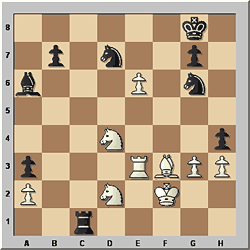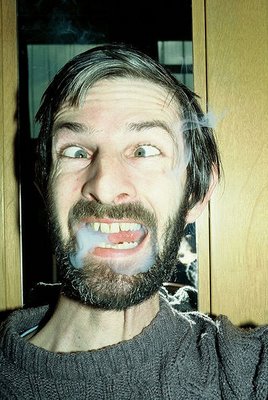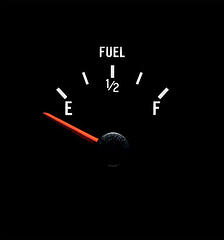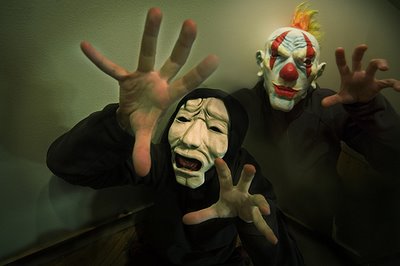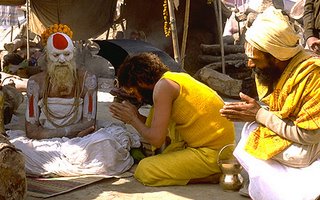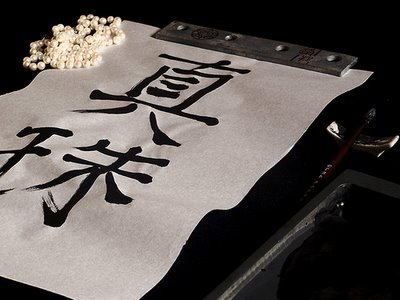dear blueDevil: rainer maria rilka, of Duino Eligies kind, and Sonets to Orpheus, wrote a fine book i was directed to in much younger days called Letters to a Young Poet. evidently he knew wittgenstein, Saul Frau (i don't want to look up the name, but she knew all those guys in a way that a woman would) or such, Rodin, etc. if 'etc' is not too gross a term, so i propose to write letters to a young bluedevil.

but before i quickly do such a missive, i wish to add parenthetically that when i went to korea with Zen Master Soen Sa Nim, kinda of a Fredrico Felini goes to the zen mountain temple kind of guy, on that trip i had the good pleasure of meeting translater now author Stephen Mitchel, who translated Rilke wonderfully... in fact, i read of Soen Sa Nim long befor meeting him, or Dae Soen Sa Nim (Dae: Kor. for "Great"). in any event, mitchel was a dear gentle man, with a very lovely korean accupunturist sife who manipulated the top of my crown on the top of my head (a sensative, critical point in accuncture), to alleviate some intense discomfort in my lower body, long story about over stretching in my martial arts days of long wide legs... and he latter went on to translate Job, the Book of John, the Koran, the Tao Te Ching, Rumi, what did he possibly miss? teaching himself at once first german then hebrew. those guys didn't so much as translate as learn to read good translations and render them with a poets ear, as ezra pound did with confucius's annelects, using french and german interlineal translations... so himm, where was i?

i just got off work, had one of those ten minute naps at home during lunch = two nights good sleep THEN a good cup of dark coffee, and so ready to go after writing you here if i may: hit CTA hard then CTS, then i get to lay in bed with mr. alburt with all the windows open...
i always asked Yasser, what will happen to my chess when i get a girlfriend again...
so to ("chess) young"BlueDevil:
i had the good fortune to find a coach at icc. well, not really, he found me. he wanted to trade me my teaching him investing for chess coaching. its funny, i feel no need to blog about quantitative investing, as i have mastered it, yet here like to write and master none of it. cognitive dissonance or OCD? OCD is not QGD, KGA, KID or queen gambit declined, kings gambit accepted or kings indian defence? new chess term: OCD. OCD by batesford, or gambit. soon to be in print.
charles, my coach, is 2200 fide. whether he is higher or lower does not concern me, only that he be able to tell me how to advance and has himself traversed this same terrain AND communicate clearly his learning how to learn.
he told me to do CTS, which i inhaled. of course, i already did Seirawans Winning Chess Tactics after Chernev's Winning Chess, and weak attempts to start Reinfeld's 1001 Sacrifices and Combinations.
He then told me to do CTA ** A F T E R ** i hit 10,000 chess.emrald.net. he also told me to start Muellers Secrets of Pawn Endings and to really hit Shereshevsky's Endgame Strategy.
It is important to say, that this is after about 3,000 rapid games 3 min/12 sec increment on Y!yahoo, then early this winter MAKING myself switch to 3/8. i also read chernevs Practical Chess Endings over a year without a board, VERY slowly, doing all variations in my head. that was of course after Pandolphini's Endgame Course. his work is sloppy, it is said, but HE is not bad as evidenced by his chess.cafe column which is not a stupid column by any means, as he is obviously broadly educated in the humanities and learning.
lastly, i spent three years going slowly through 941 GM classic games, from such books as Nunn, Understanding Chess Move By Move, My System, Stohl's Instructive Modern Chess Masterpieces ** W I T H ** O U T ** U S I N G ** the annotations but rather just sources the games from the books. id try to see what was going on and guess the next move. i rendered them all into pgn or used various sources including Osmitz (sp?).
all this ** B E F O R E ** trying any advanced training software or systems.
what of you?
i have not read all your posts. and i am not your coach. but someone a little ahead of you, who just as charles at 2200 can tell me at 1650 or so OBP how to improve, maybe if you are 1200+/- i can say a tiny bit, if polite and not intrusive or judgemental?
it seems to me, if you are doing tactical software or CTA or renko or whatever it is, this is too advanced. you can slow it down. those basic books sound good, including winning chess et al.
secondly, i dont know what you are playing OBP but if you haven't played 1,000 1,500, or 2,000 games+, then there is insufficient context to put the 'jaz' into.
lastly, if you were 52.4% across 94 problems, then you either are going too fast, or aren't comfortable with the interface. if you must do CTS, then please consider going slowly. the one exogenus advantage of the site is that it puts you in the context of a community of users in real time. very motivating. and try to be an 80%, 85% user, not a quick 68 or 75% user. you will notice the difference. i mean, you can just sit and stare at it. tempo does; wormwood does. and i do. it won't kill you. let the clock run. speed will come.
in tae chi, you learn to fight in slow motion latter on. then the masters add speed over the year and do they add it!
so lots of play. less advanced study which can be demoralizing. and targeted study, maybe from book tactics not timed stuff--which will demoralize you till you learn more basic stuff, or if know it, then learn to access it and see it.
very lastly: at a certain point, i decided to ONLY play folks rated > than me. i learned to fear folks who had negative win/loss ratios. like 400w/700L/50d=1150 games. but the folks who were 850w/250L/50d=1150 rated near me, id not fear them. i almost always concretely planned to win and expected the win. are ratings all the same according to asymtotes approaching a physically real but slightly incommensurable or indeterminate--fuzzy--boundary? yes and no.
i lost a lot. but only once i did this, to subject myself to regular punishiment, did my game start to improve. of course, i lost many a won game, and as pandolphini says of a class B or 1800 being someone "who can win a won game", so i lost many a won game, either on the clock, or in a superior opening lost in tactical complications too much to see in seconds on increment...
BUT, and this is a big but, when you beat someone two or three hundred elo above you, how sweet, how delectable it is? then when they start to accuse you of cheating, as i think also happened to temposchlucker was it? this is the best! accusing of using a prog. Yasser has folks write ICC all the time... : "he is a prog" (chess analytic progarma a.k.a Fritz, Crafty, Junior, etc). but they write him, "no, he is NOT a prog!".
once i started CTS, id play VERRRRY rarely and still do, but when i do, i surprise most everyone 100 or 150 elo > me.
these ++ elo' above you will punish our sins. if you loose too many, then go down one league. if start to approach 50% w/L, then aught to move up one league. also as pandolphini says.
with 100 elo, you aught to win 1 out of 3. 200 elo win 1 out of 10. the basics. slowly. lots of games. review lost games. good beer or naps.
you absolutely have to be a bright and very talented man to have accomplished what you have outside of chess, so, what is it you want here? surely your webWork and neuroWork and policalMissives so well crafted all point to an exceptionally talented and alert mind, able to do whatever it wants.
warmly, dk
 a nice day at CTS, but nevertheless upon the cost of a terrable day at ctArt3.0. respective performances:
a nice day at CTS, but nevertheless upon the cost of a terrable day at ctArt3.0. respective performances: i have all year to do levels three to nine, and also need to finish Averbakh's Endgame Essential Knowledge, which i am substantial complete on. then i need to start on Muellers, secrets of pawn endings--principly for training in another form of calculation; and start shereshevskys endgame strategy--for planning.
i have all year to do levels three to nine, and also need to finish Averbakh's Endgame Essential Knowledge, which i am substantial complete on. then i need to start on Muellers, secrets of pawn endings--principly for training in another form of calculation; and start shereshevskys endgame strategy--for planning. following up on tempos apt mention of an article where the amount of chess knowledge and amount of pattern recognition knowledge betwen and among different levels of class A versus Master and Grandmasters command (Dr. de Groot's research of 30 years quoted in chessCafe.com's archives, under Novice Nook #29, by Dan Heisenman), i thought it appropriate to relate this to second article tempo would appreciate. it is in by NM Todd Bardwick of colorado usa, with very interesting things on progress in chess relative to ratings, and who must beat who, and in what way.
following up on tempos apt mention of an article where the amount of chess knowledge and amount of pattern recognition knowledge betwen and among different levels of class A versus Master and Grandmasters command (Dr. de Groot's research of 30 years quoted in chessCafe.com's archives, under Novice Nook #29, by Dan Heisenman), i thought it appropriate to relate this to second article tempo would appreciate. it is in by NM Todd Bardwick of colorado usa, with very interesting things on progress in chess relative to ratings, and who must beat who, and in what way.
